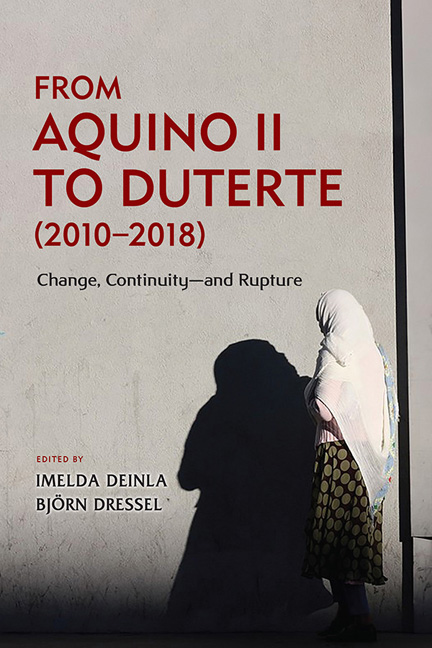Book contents
- Frontmatter
- Contents
- List of Tables
- List of Figures
- Acknowledgements
- Acronyms and Glossary
- Contributors
- Introduction: From Aquino II to Duterte (2010–2018): Change, Continuity—and Rupture 1
- PART I POLITICS AND GOVERNANCE
- PART II ECONOMIC GOVERNANCE
- PART III PEACE PROCESS IN MINDANAO
- PART IV INTERNATIONAL ENVIRONMENT
- 9 The Philippines and the South China Sea/West Philippine Sea Conflict: Challenges and Prospects for Peace, Diplomacy and External Defence Capability
- 10 Fall from Grace, Descent from Power? Civil Society after Philippine Democracy's Lost Decade
- Index
9 - The Philippines and the South China Sea/West Philippine Sea Conflict: Challenges and Prospects for Peace, Diplomacy and External Defence Capability
from PART IV - INTERNATIONAL ENVIRONMENT
Published online by Cambridge University Press: 31 January 2020
- Frontmatter
- Contents
- List of Tables
- List of Figures
- Acknowledgements
- Acronyms and Glossary
- Contributors
- Introduction: From Aquino II to Duterte (2010–2018): Change, Continuity—and Rupture 1
- PART I POLITICS AND GOVERNANCE
- PART II ECONOMIC GOVERNANCE
- PART III PEACE PROCESS IN MINDANAO
- PART IV INTERNATIONAL ENVIRONMENT
- 9 The Philippines and the South China Sea/West Philippine Sea Conflict: Challenges and Prospects for Peace, Diplomacy and External Defence Capability
- 10 Fall from Grace, Descent from Power? Civil Society after Philippine Democracy's Lost Decade
- Index
Summary
INTRODUCTION
This chapter examines the Philippines’ government policy towards the South China Sea (SCS) dispute since 1995 in the context of bilateral relations with China as well as membership in the Association of Southeast Asian Nations (ASEAN). Specifically, it looks at how the country has managed its maritime dispute with China since the Mischief Reef incident in 1995 and the implications of the international court's ruling in July 2016 for its bilateral ties with China and ASEAN regional diplomacy, as well as its external defence posture. Using a neoclassical realist perspective, I argue that—despite the favourable ruling of the international court—the Philippines under the new administration of President Duterte still faces a number of challenges in managing its maritime conflict with China. These challenges include: difficulties in renormalization of relations with Beijing; the push for a regional Code of Conduct (COC) between China and the ASEAN in the SCS; and the dismal state of the Philippines’ external defence capability. This author also contends that, under new leadership, the Philippines should seriously consider embarking on developing selfreliance or self-help capability as part of its internal balancing strategy, which should have been the country's core defence strategy since 1992, to effectively protect its interests in the West Philippine Sea.
Self-help is fundamentally a principle of action in an anarchical system of states where each state actor is responsible for their own survival or security. Realists do not consider it prudent for states to rely on other states or institutions to ensure their security. While powerful states can pursue military or defence build-up when they feel threatened by other states, this may not be adequate for smaller states especially if they face a more powerful hegemonic state. To compensate, small states may resort to balance of power strategies by aligning with a more powerful state or forming alliances with other states to counter a perceived hegemony. From a neorealist perspective, states can pursue balance of power internally, by mobilizing internal resources to build economic and defence capability, and externally, by forming alliances or bandwagoning with other states. According to Waltz, power is a means to ensure a state's security and the concern of states is ultimately to maximize security.
- Type
- Chapter
- Information
- From Aquino II to Duterte (2010–2018)Change, Continuity—and Rupture, pp. 265 - 284Publisher: ISEAS–Yusof Ishak InstitutePrint publication year: 2019



